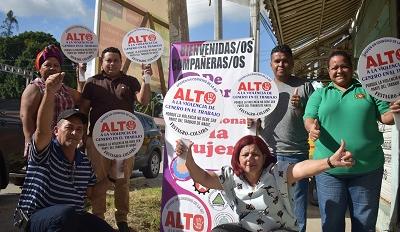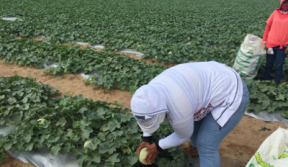
Fyffes’ announcement about its new “Global Gender Equality Program” today, on International Women’s Day, fell flat with trade unionists in Honduras. Fyffes is an Irish multinational company owned by the Japanese conglomerate Sumitomo, and one of the largest fruit brands in the world and the top importer of winter-season melons to the U.S. market. Right now, Fyffes is exporting many of these melons from Honduras.
Following a three-year global campaign urging Fyffes to remediate two decades of human and labor rights abuses on its Honduran melon plantations, including wage theft and exposure to toxic agrochemicals, on January 11, 2019, Fyffes signed an agreement recognizing STAS – el Sindicato de Trabajadores de la Agroindustria y Similares – as the legitimate union representative of workers employed at Fyffes’ melon subsidiaries in Honduras. The agreement states that collective bargaining negotiations with STAS will begin on February 5 and the company will rehire union members who have not been rehired this harvest season due to their union affiliation. Fyffes, however, has reneged on both fronts and union members report ongoing harassment and intimidation, bringing back memories of when the workers originally tried to form the union in 2016 and Fyffes responded with a violent anti-union campaign, locking union members in offices and forcing them to resign, illegally firing workers, and psychologically and verbally harassing affiliated workers.
Ever since the signing of the January 11 agreement, workers have reported that Fyffes’ local management have systematically intensified and escalated the anti-union harassment and violence in the following ways:
- Management has halted work on the plantations to make workers affiliate to the employer-controlled unions. Workers have reported that they are being promised bonuses and family baskets at the end of the harvest if they affiliate to the employer-controlled unions. If they don’t affiliate, management is threatening that the company would close its operations and that they wouldn’t be rehired the next season.
- A STAS-affiliated worker was taken in a vehicle to a solitary plantation lot and told that they would not be rehired if they didn’t affiliate to the employer-controlled union.
- A STAS-affiliated worker was physically hit by a manager and fired. The worker was rehired after STAS filed complaints with the Labor Ministry, CONADEH and the Police.
- A STAS-affiliated worker was told by management that they would only be reinstated if they join the employer-controlled union and disaffiliate from STAS.
- Some STAS affiliates have been reinstated on the condition that they not be involved with STAS.
- Workers have reported that they have received visits from immediate supervisors to their homes in order to affiliate to the employer-created union.
- Various workers have reported that protests against STAS were promoted by the company and that management was integrated in these protests.
“Charity is not the same as justice. The farmworkers want Fyffes to follow the law, not to create programs in order to distract from the company’s obligation to put an end to and remediate labor rights violations that have been taking place for over a decade and that have received attention around the world,” said Ahrax Mayorga, an organizer with STAS-FESTAGRO. “We’re not against gender programming, but we’re against it when it’s used to cover up labor abuses and circumvent the law.”
“Because of the severe anti-union violence carried out by Fyffes over the past three years, the company lacks any credibility to carry out so-called equality programs,” said Gabby Rosazza, a campaigner with the International Labor Rights Forum. “The freedom to speak out against violations doesn’t exist and won’t exist until farmworkers have their full set of rights guaranteed in a union contract.”
Of all the farms where Fyffes could have started its new gender equality programming, it is a remarkable coincidence that Fyffes launched precisely on those plantations where there have been recent reports of labor rights violations. It is for these violations that the Ethical Trading Initiative suspended Fyffes and that Fair Trade USA decertified Fyffes. These violations and Fyffes’ actions have also been cited in complaints under the U.S.-Central America Free Trade Agreement and the International Labour Organization.
Two years ago, Fyffes dismissed 65 security guards, who had not received vacation time or holiday pay, after the guards decided to organize with STAS. Most of the 43 union members that Fyffes committed to reinstate under the January 11 agreement have not been rehired, and some of those who got their jobs back were told by management to disaffiliate from STAS.
“In this context, it must be understood that any reluctance that workers have to raise complaints at work is largely due to their fear of losing their job, rather than due to concerns about what their peers may think, which is what Fyffes has implied in its gender equality programming announcement,” said Rosazza. “Unions are the true agents of change in the workplace and Fyffes should not form any committees to ‘give workers the confidence to tackle inappropriate workplace behavior’ until it has bargained in good faith with STAS and signed a union contract.”

